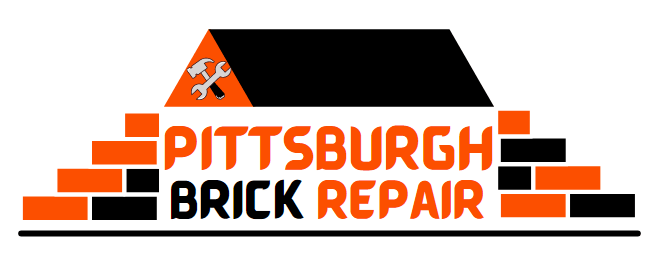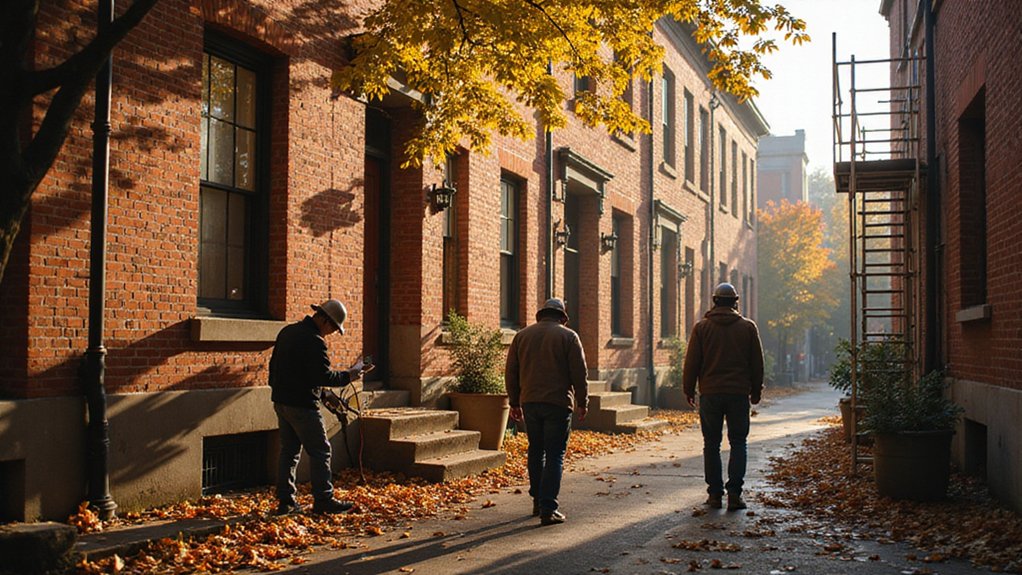If you’re a Pittsburgh homeowner, you know how harsh winter can be on your masonry. Protecting your brick and stone structures requires strategic timing and careful planning. Choosing the right season for repairs isn’t just about temperature—it’s about preserving your property’s structural integrity and aesthetic value. Would you like to uncover how seasonal changes dramatically impact your masonry maintenance strategy? The answer might surprise you and save you thousands in potential repair costs.
Understanding Pittsburgh’s Climate Challenges for Masonry
While Pittsburgh’s diverse climate poses unique challenges for masonry structures, understanding these environmental factors is essential for effective maintenance and restoration.
You’ll encounter significant stress from frequent freeze thaw cycles that can damage your brick and stone surfaces. Moisture retention becomes a critical concern, especially during winter and early spring when temperatures fluctuate dramatically. These conditions cause expansion and contraction in masonry materials, leading to potential cracks, erosion, and structural weakening. Tuckpointing services can help address these climate-induced damages by professionally refilling mortar joints and preventing further structural deterioration.
Why Seasonal Timing Matters for Brick and Stone Repairs
Because Pittsburgh’s masonry repair needs are deeply tied to seasonal changes, understanding the right time for brick and stone restoration can save you significant money and prevent long-term structural damage. Late spring and early fall offer ideal conditions for repairs, when moisture content is stable and freeze thaw cycles are minimal. Tuckpointing professionals recommend protecting masonry structures before winter’s harsh conditions can cause significant damage to mortar joints and brick integrity.
You’ll want to avoid winter’s harsh temperatures and summer’s extreme heat, which can compromise repair materials and effectiveness. Timing your masonry repairs strategically guarantees better adhesion, durability, and protection for your home’s critical structural elements.
Spring Masonry Repair Strategies
As Pittsburgh’s winter thaws and spring emerges, homeowners can strategically address masonry damage before summer’s intense heat sets in. Recognizing seasonal exposure conditions helps you plan effective repairs that protect your investment and prevent further deterioration.
Consider these critical spring masonry repair strategies:
- Inspect exterior walls for winter-related cracks and moisture damage
- Clean and prepare surfaces before applying repair materials
- Check mortar joints for potential replacement needs
- Schedule professional assessments to identify hidden structural issues
Necessary preparation steps will verify your masonry repairs are thorough and long-lasting, maintaining your home’s structural integrity and aesthetic appeal.
Summer Techniques for Effective Stone and Brick Work
Summer’s warm temperatures and extended daylight hours provide ideal conditions for thorough stone and brick repair work in Pittsburgh. You’ll want to carefully address joint lubrication during these months, as seasonal expansion can create unique challenges for masonry.
Skilled contractors understand that summer heat allows for better material adhesion and faster curing times. When planning your repairs, consider the temperature and humidity levels, which directly impact your project’s success. By choosing the right techniques and timing, you can restore your stone and brick structures effectively, ensuring long-lasting durability and aesthetic appeal.
Fall Maintenance and Restoration Opportunities
When Pittsburgh’s autumn arrives, it brings unique opportunities for masonry restoration that homeowners shouldn’t overlook. Fall’s moderate temperatures create ideal conditions for thorough repairs and preventative maintenance.
Consider these seasonal inspections and cost-effective approaches:
- Check exterior brick and stone for moisture damage
- Seal potential cracks before winter freezing occurs
- Assess mortar joints for deterioration
- Schedule professional evaluations while contractors have lighter workloads
You’ll protect your property’s structural integrity and save money by addressing issues proactively during this strategic maintenance window. Don’t wait until winter’s harsh conditions compromise your home’s masonry.
Winter Masonry Repair Limitations and Considerations
Pittsburgh’s winter presents significant challenges for masonry repairs, making it the least favorable season for extensive, thorough, detailed restoration work. Freezing temperatures can severely compromise repair quality, causing frozen mortar conditions that prevent proper bonding and curing.
You’ll want to avoid outdoor masonry projects during these cold months, as moisture infiltration and temperature fluctuations can create additional structural damage. Professional masons recommend postponing major repairs until warmer seasons when materials can set correctly and withstand environmental stress. Your patience during winter will conclusively safeguard your property’s long-term integrity.
Critical Factors Beyond Temperature for Successful Repairs
Though temperature plays a critical role, successful masonry repairs depend on multiple essential factors beyond just weather conditions. When planning your repair project, you’ll want to analyze several key elements that impact the outcome:
- Moisture levels must be meticulously assessed to prevent future damage
- Structural integrity requires thorough professional evaluation
- Material compatibility guarantees long-lasting repair solutions
- Surface preparation determines adhesion and durability
You’ll need expert guidance to maneuver these complex considerations, guaranteeing your masonry repairs are both effective and lasting. Your investment deserves careful, strategic planning.
Protecting Your Property: Long-Term Masonry Maintenance Planning
Because masonry maintenance isn’t just about fixing problems as they arise, successful property owners develop strategic, proactive approaches to preserve their building’s structural integrity.
You’ll want to implement an all-encompassing moisture management plan that prevents water damage and potential deterioration. Regular inspections can help you catch small issues before they become expensive repairs. By scheduling annual assessments and addressing minor cracks or mortar damage promptly, you’ll protect your property’s value and appearance.
Consider working with a professional who understands Pittsburgh’s unique environmental challenges and can provide customized maintenance recommendations for your specific masonry structure.
Frequently Asked Questions
How Much Do Typical Masonry Repairs Cost in Pittsburgh?
You’ll find masonry repairs in Pittsburgh typically range from $500 to $3,000, depending on materials pricing and labor cost estimates. Complex jobs can climb higher, but most homeowners budget around $1,500.
Can I Do Minor Masonry Repairs Myself Without Professional Help?
You can tackle minor masonry repairs if you’ve got basic DIY skills, but you’ll need proper safety gear and proficiency. Always assess your comfort level and potential risks before starting any home repair project.
Will Homeowners Insurance Cover Masonry Damage From Weather Conditions?
Your homeowners insurance might cover masonry weather damage, but you’ll need to review your policy coverage carefully and understand the claims process. Contact your agent to determine specific protections for your home.
How Long Do Professional Masonry Repairs Typically Take to Complete?
Your masonry repair project’s timeline depends on damage extent, but typically ranges from 1-3 days. Labor requirements vary, but professional teams can usually complete most repairs efficiently and effectively.
Are There Specific Masonry Materials Better Suited for Pittsburgh’s Climate?
You’ll want brick and stone that can withstand Pittsburgh’s harsh seasonal variations, focusing on materials resilient to freeze-thaw cycles like dense clay bricks and granite, which protect your home’s structural integrity.

